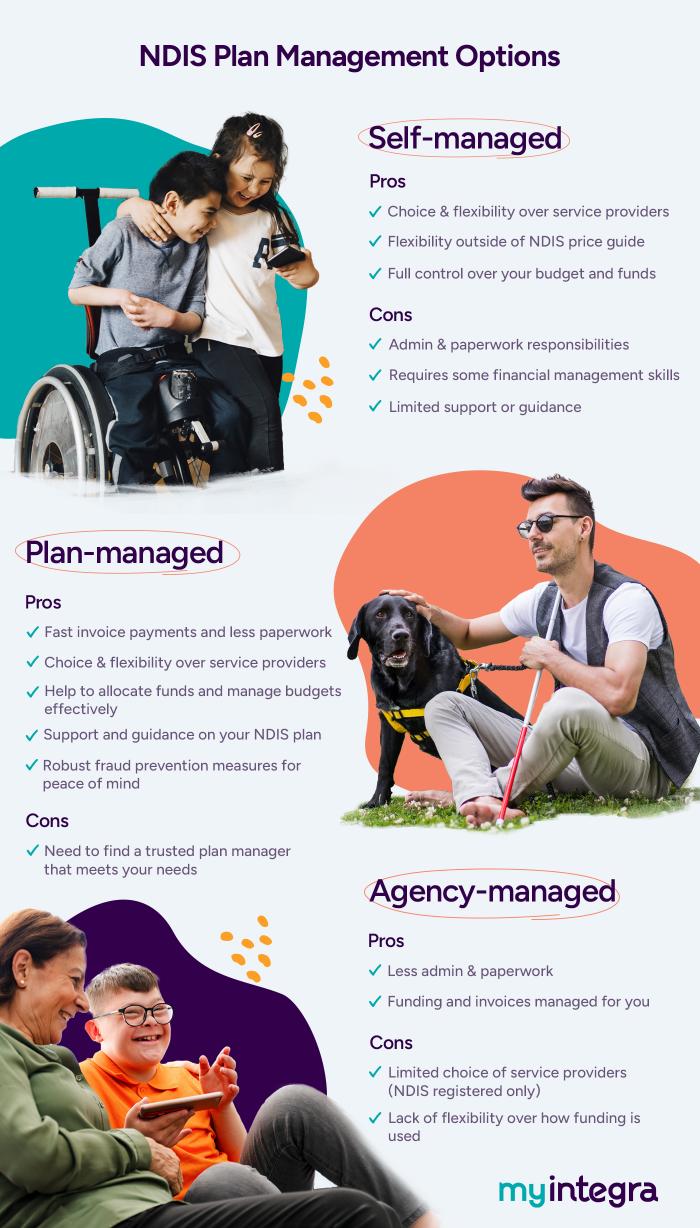
Managing your NDIS plan properly is crucial to ensuring you experience a smooth NDIS journey. Having a well-managed plan means you’ll receive the right supports when you need them, stay up-to-date with invoice payments, avoid overspending and receive uninterrupted service delivery.
Let’s explore the three plan management options you can choose from and take a look at the benefits and challenges that come with each management method.
Self-Managed
If you choose to self-manage your plan, you’ll be responsible for managing all the financial aspects, such as paying providers and keeping records of their services and invoices.
Self-managed NDIS plans give you the most control and flexibility over your funding, but they also come with the most responsibility. If you self-manage your plan, you are responsible for managing your budgets, negotiating prices with service providers, paying invoices on time, submitting claims to the NDIS and keeping track of your financial records.
Some benefits of self-managed NDIS plans include:
- Choice and flexibility in providers: You can choose any service provider that meets your needs and preferences, including providers who are not registered with the NDIS.
- Full control over your budget and funds: You have complete control over how your funding is used and can make decisions based on your individual needs and preferences.
- Flexibility outside of NDIS price guide You can decide to pay service providers above the maximum rate set.
Some of the challenges that come with self-managing your plan include:
- Administrative responsibilities and paperwork: You are responsible for managing your budgets, submitting claims, keeping track of your spending, paying invoices on time and making all financial decisions which can be extremely time-consuming.
- Need for financial management skills: You need to have the skills and knowledge to manage your budgets effectively and comply with NDIS guidelines.
- Limited support and guidance: When you self-manage a plan, you won’t have access to as much support as you would with an agency-managed or plan-managed plan.
If you think that self-managing your plan is the best option for you, speak to your local area coordinator or early childhood partner to let them know.
Plan-Managed
Plan-managed means you work with an NDIS registered provider of your choice, who offers plan-management services. You’ll work with a plan manager, who will manage the financial aspects of your plan, in line with your goals. The ultimate goal of a plan manager is to help you get the most out of your NDIS plan and maximise your funding allocation.
A plan manager is responsible for managing your funding, paying your invoices, helping you understand your budget and ensuring you aren’t overspending or getting overcharged.
Some benefits of plan management include:
- Fast invoice payments: Your plan manager will carefully review your invoices to check for accuracy, followed by fast payment, allowing you to skip doing the paperwork yourself.
- Flexibility and control over services and providers: You can choose any service provider that meets your needs and preferences, including providers who are not registered with the NDIS. Your plan manager will organise payment for any provider, no matter what financial processes they require.
- Manage your budgets: Your plan manager will help you correctly allocate your funds, and give you the tools, such as the MyIntegra budget calculator, to help avoid overspending to ensure you continue to receive uninterrupted service delivery. They will also make sure you are using your funds efficiently and keep financial records.
- Support and guidance: Your plan manager will help you understand your NDIS plan, what you are entitled to and how you are spending your budget. If you have any questions about your NDIS plan along the way, your plan manager can help.
- Robust fraud prevention: A good plan manager will have additional fraud controls to proactively identify and prevent fraudulent activity.
However, plan-managed NDIS plans also come with some challenges, including:
- Finding a plan manager who meets your needs: You need to look for a plan manager who understands your individual needs and preferences, and who can provide the support you are looking for, for example fast invoice payments and an online portal to track your budget and spend.
To learn more about the specific responsibilities of a plan manager, explore our recent blog: What does a plan manager do in the NDIS?
Agency-Managed
Agency-managed (sometimes referred to as NDIA-managed) is when the NDIA (National Disability Insurance Agency) manages your plan on your behalf, and directly pays your service providers.
Some benefits of having your NDIS plan agency-managed include:
- Less administrative responsibilities and paperwork: The NDIA is responsible for managing your funding, keeping financial records, paying invoices and submitting claims. This means agency-managed is great for people who are time-poor.
However, going with agency-managed also can come with some limitations, including:
- Limited choice and control over services and providers: You can only choose from registered NDIS service providers, which may not meet your individual needs and preferences. If you live in a regional area, it may also be more difficult to access registered service providers.
- Lack of flexibility: You could have limited control over how your funding is used and might not be able to make specific decisions based on your individual needs and preferences.
Find the right plan manager
Finding the right plan manager can make all the difference in your NDIS experience. MyIntegra is a leading plan manager, with a team dedicated to helping you get the most out of your plan. When your plan is managed by MyIntegra, you have choice, control and peace of mind that your invoices will be paid quickly, your plan managed effectively, and your expenditures monitored for you.
To learn more about if we’re the right fit for you, get in touch with our friendly team, or sign up today.
Whether you choose self-managed, agency-managed or plan-managed for your NDIS plan, the most important thing is for you to figure out what option suits you best and will allow you to receive the support you need, when you need it.

